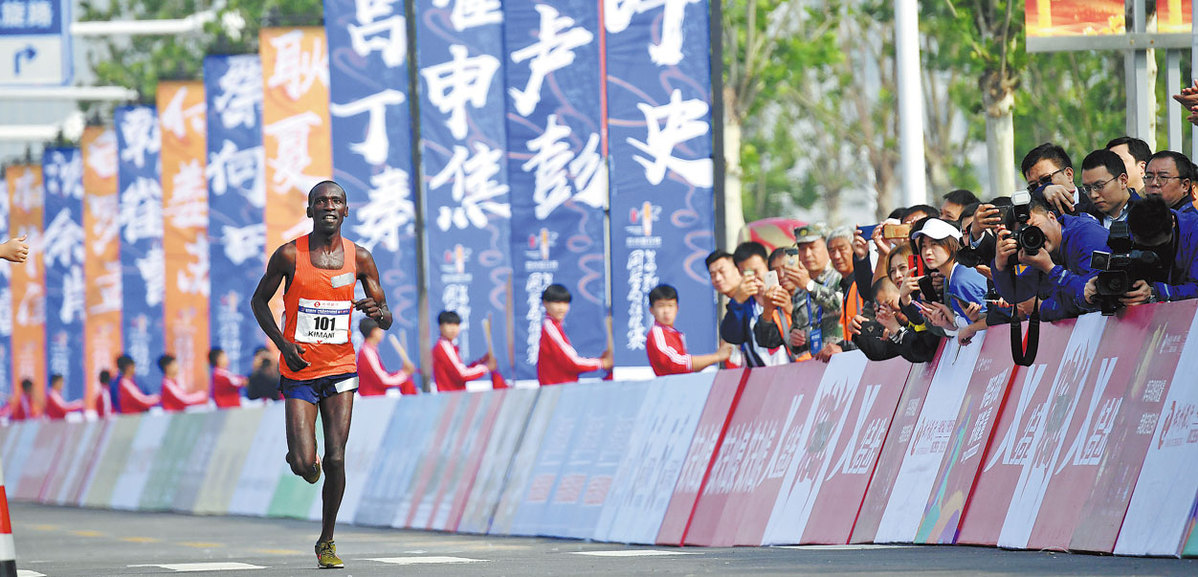All roads lead to China for Africa's runners
 0 Comment(s)
0 Comment(s) Print
Print E-mail China Daily, December 18, 2019
E-mail China Daily, December 18, 2019

Africa has long been the main force in distance running, with Western races traditionally the preferred hunting ground for the continent's elite racers.
That, however, is changing as China's running boom presents a new and lucrative route to glory for Africa's athletes, particularly those from marathon powerhouses Kenya and Ethiopia.
Increasingly, Africans are signing up with Chinese agencies to secure places in Chinese races keen to boost their global profiles by attracting the sport's biggest names.
Tao Camp, one of China's leading athlete management companies, now has over 140 elite runners from Kenya and Ethiopia on its books.
"China is in Kenya for business. It is a mutual agreement where athletes enter races in China, and their tickets, accommodation and food are paid by their agents, and all they need to do is to run and win," said Athletics Kenya vice-president Paul Mutwii.
"Then they share the prize money, which sometimes is around 40,000 US dollars."
In 2015, 134 marathons were staged in China, according to official records. In 2016 that figure stood at 328 and has been increasing at a rapid rate since.
Now the race is on for a Chinese marathon to be added to the Abbot World Marathon Majors list, with the Chengdu Marathon currently under consideration to join Tokyo, Boston, London, Berlin, Chicago and New York City on the elite global series.
Reigning New York City champion Geoffrey Kamworor believes top Chinese races are earning the right to be mentioned in the same breath as the majors.
"Kenya has so much talent. Up-and-coming athletes who have not made a name for themselves in Europe find China as an alternative and this is boosting the level of competition in China," said Kamworor, who won gold for Kenya at the 2015 World Cross-Country Championships in Guiyang, Guizhou province.
"Soon top runners will be starting in China before considering other races, especially if they improve on the prize money," said Kamowror. "Marathons in China have opened more opportunities for Kenyans."
Chemabwai Sang, a retired middle-distance runner from Kenya, says the Chinese running boom is shaping a new era in athletics.
"Back in our day, Kenyans had very little information about races in China. Besides, there were no agents promoting China, and so Kenyan athletes only knew of European meets," said Sang.
"That is changing with the entry of Chinese agents, working with local coaches here in Eldoret."
In recent years, a number of Chinese athletes have been training in Eldoret, a western Kenyan city where over 300,000 runners are based.
Italian coach Renato Canova was behind a project to train 16 members of China's national women's distance-running team there, in preparation for the 2015 World Athletics Championships in Beijing.
In Eldoret, running is an industry that easily rivals the local farming or manufacturing sectors.
The city has produced a disproportionate number of long-distance legends, including Eliud Kipchoge, who in October became the first man to run a marathon in less than two hours.
With the assistance of 41 pacemakers, Kipchoge clocked an unofficial 1:59.40 in Vienna, while on the same weekend in Chicago his compatriot Brigid Kosgei set a women's marathon record of 2:14.04, breaking Briton Paula Radcliffe's 16-year-old mark.
Kipchoge and Kosgei lead a horde of Kenyan runners who have made a good living out of road racing.
With limited races to enter on the track, road running and marathons have become a more viable option for African athletes, with some events offering prize purses in excess of $250,000, on top of appearance fees.
Endorsement contracts with sportswear brands, such as China's Li-Ning, can generate additional income, with the success of these athletes inspiring others to take the marathon route to riches, according to Kenyan distance great Robert Kipkoech Cheruiyot.
"In Kenya and Ethiopia and other major athletics and running countries, people are using the sport to improve their lives and lifestyles," said the former New York City and Boston marathon champion.






Go to Forum >>0 Comment(s)